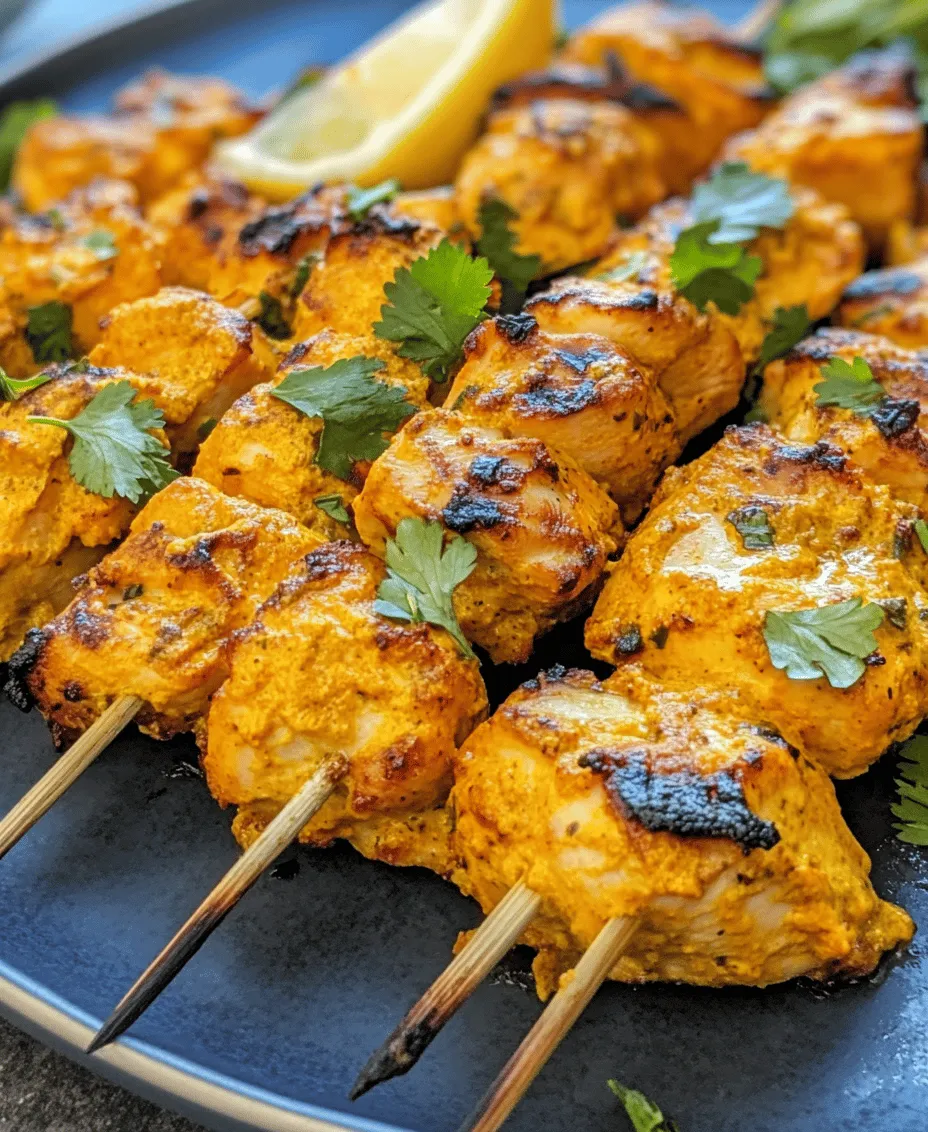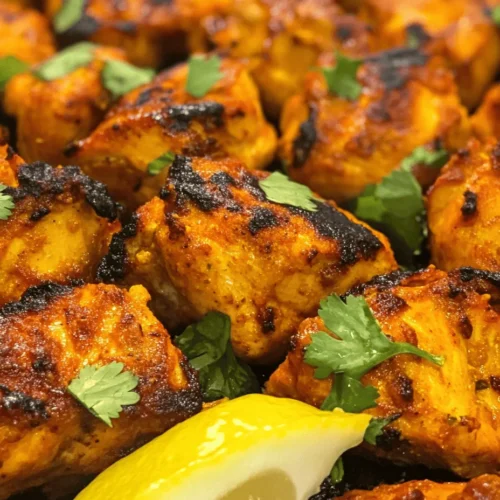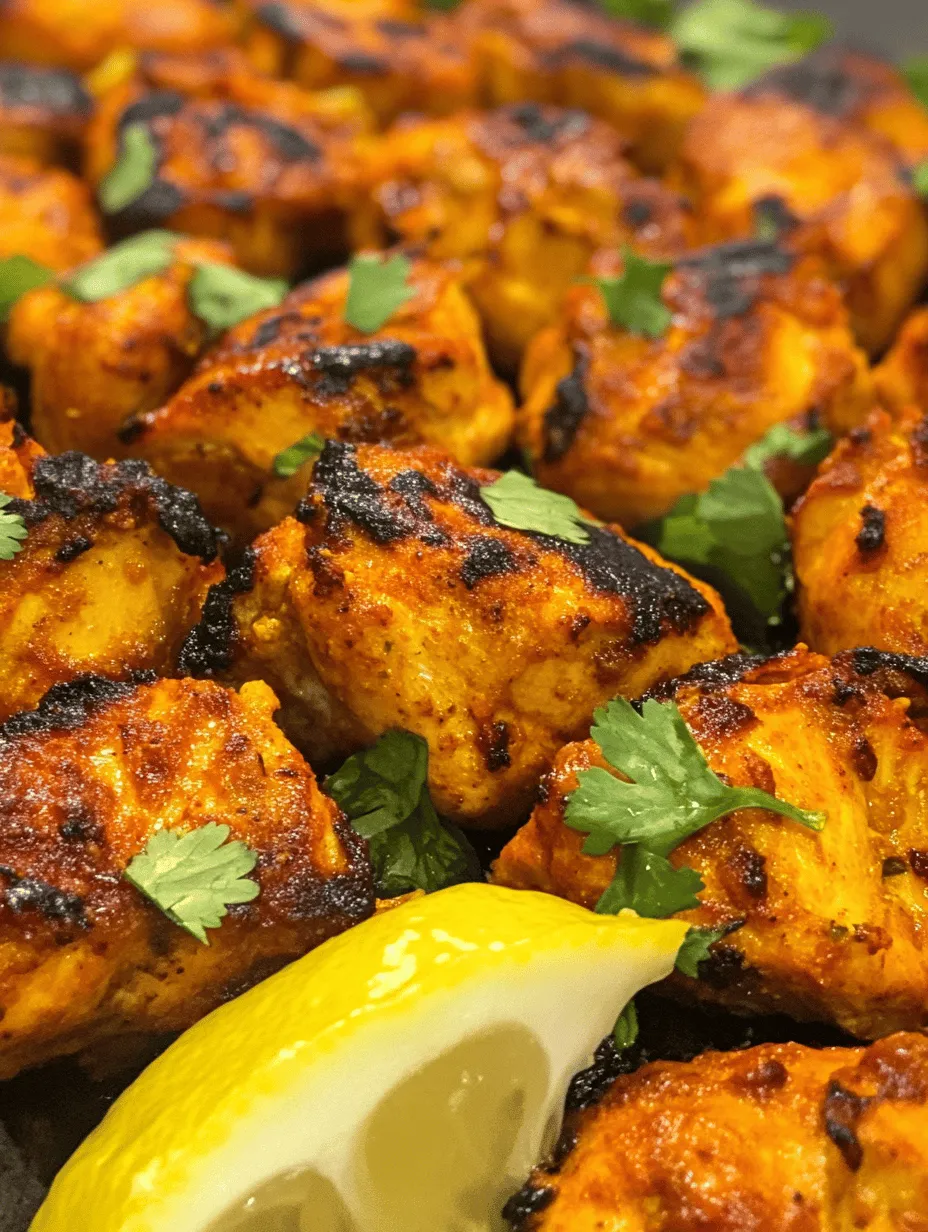Grilled Tandoori Chicken Delight is more than just a meal; it’s an experience that brings the vibrant and rich flavors of Indian cuisine right to your backyard barbecue. This dish is a celebration of spices, herbs, and the transformative power of yogurt, all working together to create succulent chicken that is perfect for any gathering. Whether you’re hosting a summer cookout or simply enjoying a quiet evening at home, Tandoori Chicken is sure to impress family and friends alike with its tantalizing aroma and mouthwatering taste.
Understanding Tandoori Cooking
Exploring the Origins of Tandoori Cooking
Tandoori cooking has its roots in the Indian subcontinent, where it has been a cherished method of preparing food for centuries. The term “tandoor” refers to a traditional clay oven that is heated with charcoal or wood, which imparts a unique flavor to the food. Originally, this cooking style stems from the northern regions of India, particularly Punjab, where it was used to prepare various meats and breads. Tandoori cooking is characterized by its use of high temperatures and the addition of aromatic spices, which create a distinctive smoky flavor.
The Tandoor oven, with its cylindrical shape, allows for even heat distribution, making it ideal for cooking marinated meats. As the chicken cooks, the intense heat seals in the juices while the spices caramelize, resulting in a dish that is tender on the inside with a beautifully charred exterior. This method of cooking has been embraced worldwide, evolving into various adaptations that pay homage to its flavorful heritage.
Delving into the Traditional Techniques
While modern grills and ovens can replicate the effects of the traditional tandoor, understanding the traditional techniques can enhance your grilling experience. Traditionally, meats are marinated for several hours, often overnight, allowing the spices to penetrate deeply and tenderize the meat. The marination process is crucial, as it not only infuses the chicken with flavor but also helps maintain moisture during cooking.
In addition to chicken, tandoori cooking is also used for a variety of other proteins, including lamb, fish, and even vegetables. Each ingredient benefits from the same marination process and high-heat cooking method, resulting in an array of delicious dishes that celebrate the versatility of Tandoori cooking.
The Role of the Tandoor Oven in Authentic Recipes
The Tandoor oven is central to authentic Tandoori cooking. Its design allows for incredibly high temperatures, often exceeding 900°F (482°C), which is essential for achieving the perfect char on the chicken. The clay construction of the oven contributes to the distinctive flavor by trapping moisture and smoke, which imbues the meat with an irresistible aroma.
While many home cooks may not have access to a tandoor, the good news is that you can achieve a similar effect on your gas or charcoal grill. By replicating the high-heat environment and using essential spices and marinades, you can create your own Grilled Tandoori Chicken Delight that captures the essence of this traditional cooking style.
Ingredients Breakdown
Key Ingredients for Grilled Tandoori Chicken
To prepare Grilled Tandoori Chicken Delight, a selection of key ingredients is needed. These ingredients not only form the base of the dish but also ensure that each bite is packed with flavor. Here are the essential components:
– Chicken: The star of the dish. A whole chicken cut into pieces or chicken thighs are ideal for marination and grilling.
– Yogurt: A crucial element in the marinade, yogurt tenderizes the chicken while adding a tangy flavor.
– Tandoori Masala: A spice blend that includes cumin, coriander, paprika, turmeric, and other spices, providing the signature taste of Tandoori chicken.
– Ginger and Garlic Paste: Essential for depth of flavor, adding a warm, aromatic quality to the marinade.
– Lemon Juice: Adds acidity, balancing the richness of the chicken and yogurt.
The Importance of Yogurt in Marinades
Yogurt plays a pivotal role in Tandoori chicken marinades. Its acidity helps to tenderize the chicken, allowing the flavors from the spices to penetrate deeply. The creamy texture of yogurt also aids in creating a coating that clings to the chicken, ensuring that each piece is evenly seasoned. The result is juicy, flavorful chicken that bursts with flavor with every bite.
Exploring the Spices: Tandoori Masala, Garam Masala, and More
The magic of Tandoori chicken lies in the spices. Tandoori masala is a blend of spices that can vary from region to region but typically includes:
– Cumin: Adds an earthy flavor.
– Coriander: Provides a citrusy note.
– Paprika: Contributes color and mild heat.
– Turmeric: Offers an earthy flavor and vibrant color.
– Cayenne Pepper: For an extra kick.
In addition to Tandoori masala, garam masala may also be used to enhance the flavor profile. This spice blend includes a variety of warming spices that add complexity and depth to the dish.
Choosing the Right Chicken: Whole vs. Cut Pieces
When making Grilled Tandoori Chicken Delight, the choice of chicken is essential. You can opt for a whole chicken, cut into pieces, or individual pieces like thighs, drumsticks, or breasts. Whole chickens are excellent for flavor, as they retain moisture better during grilling. However, using cut pieces can reduce cooking time and allow for more surface area for marination.
Fresh vs. Dried Ingredients: What’s Best for Flavor?
In cooking, fresh ingredients often provide a more vibrant flavor than dried ones. When preparing your Grilled Tandoori Chicken, using fresh spices and herbs can elevate the dish. However, if fresh ingredients are not available, high-quality dried spices can still yield delicious results. For the best flavor, consider grinding whole spices just before use to release their essential oils and aromas.
Step-by-Step Preparation
Preparing the Marinade for Maximum Flavor
To achieve the ultimate flavor in your Grilled Tandoori Chicken, the marinade is key. Start by combining yogurt with Tandoori masala, ginger and garlic paste, lemon juice, and a pinch of salt. The yogurt will act as the base, while the spices will infuse the chicken with their aromatic qualities.
1. In a large mixing bowl, combine 1 cup of plain yogurt, 2 tablespoons of Tandoori masala, 1 tablespoon of ginger-garlic paste, and the juice of one lemon.
2. Mix thoroughly until the ingredients are well combined. The marinade should be smooth and have a vibrant color due to the spices.
The Science of Marination: Why Time Matters
Marination is a crucial step that should not be rushed. Allowing the chicken to marinate for at least 4 hours, or ideally overnight, gives the flavors time to penetrate the meat. The acids in the yogurt help break down the proteins, resulting in tender, juicy chicken. As a general rule, the longer the chicken marinates, the more flavorful it will be.
How to Properly Marinate Chicken
To properly marinate chicken, follow these steps:
1. Prepare your chicken: If using a whole chicken, cut it into pieces. For cut pieces, ensure they are evenly sized for consistent cooking.
2. Coat the chicken: Add the chicken to the marinade, ensuring each piece is well-coated. Use your hands to rub the marinade into the chicken, making sure to get it under the skin if using bone-in pieces.
3. Cover and refrigerate: Seal the bowl with plastic wrap or transfer the chicken to a resealable plastic bag. Refrigerate for the recommended time.
Tips for Achieving Perfect Grill Marks
When it’s time to grill, achieving those perfect grill marks is all about technique. Here are some tips to ensure success:
1. Preheat your grill: Ensure your grill is hot before placing the chicken on it. A well-heated grill will help sear the chicken, creating beautiful grill marks.
2. Avoid overcrowding: Give each piece enough space on the grill. Overcrowding can lead to steaming rather than grilling, preventing those coveted marks.
3. Don’t flip too soon: Allow the chicken to cook for several minutes on one side before flipping. This will help develop a nice crust and prevent sticking.
By following these steps and embracing the art of marination, you are well on your way to creating a memorable Grilled Tandoori Chicken Delight that showcases the rich culinary traditions of India. In the next part of this article, we will delve into the grilling techniques that will ensure your chicken comes out perfectly every time.

Preheating the Grill: Essential Tips
Before you dive into cooking your Grilled Tandoori Chicken Delight, it’s crucial to preheat your grill effectively. Preheating not only ensures that your chicken cooks evenly but also helps achieve that coveted char and smoky flavor characteristic of tandoori cooking. Here are some essential tips for preheating your grill:
1. Clean the Grill Grates: Start by cleaning your grill grates thoroughly to remove any residue from previous cooking. This step prevents sticking and ensures that the flavors of your tandoori chicken remain pure.
2. Heat Settings: For gas grills, turn on all burners to high and close the lid. For charcoal grills, light the charcoal and let it burn until covered with a light ash. This process usually takes about 15-20 minutes.
3. Temperature Check: Aim for a temperature of around 450°F to 500°F. You can check this by holding your hand above the grill grates; if you can only hold it there for 2-3 seconds, the heat is just right.
Understanding Grill Settings: Direct vs. Indirect Heat
Understanding the difference between direct and indirect heat is essential for grilling the perfect Tandoori Chicken.
– Direct Heat: This method involves cooking food directly over the flame or heat source. It is ideal for searing and browning your chicken, creating that beautiful char on the surface. For tandoori chicken, you can begin with direct heat to achieve a nice crust.
– Indirect Heat: This method involves cooking food next to the heat source rather than directly over it. It is perfect for larger cuts of meat or when you want to cook the chicken through without burning the outside. Once your chicken has developed a good char, move it to an indirect heat zone to allow it to cook completely without drying out.
Monitoring Temperature: Ensuring Safe Cooking
Monitoring the internal temperature of your chicken is crucial for both safety and flavor. The USDA recommends that chicken be cooked to an internal temperature of 165°F to ensure it is safe to eat. Use a meat thermometer to check the thickest part of the chicken, typically the breast or thigh.
– Basting: If you’re basting your chicken with additional marinade or oil, do so during the last 10 minutes of grilling. This technique adds flavor without risking undercooking the meat.
– Resting Period: After removing the chicken from the grill, allow it to rest for about 5-10 minutes. This resting period helps the juices redistribute throughout the meat, resulting in a juicier final product.
How to Achieve the Ideal Char and Juiciness
Achieving the ideal char while maintaining juiciness can be a balancing act, but it is entirely doable with the right techniques:
1. Marinate for Adequate Time: The longer you marinate your chicken, the more flavor and moisture it will absorb. Overnight marination is ideal, but even a few hours can make a significant difference.
2. Avoid Flipping Too Often: Allow your chicken to sear properly on each side by not flipping it too frequently. Letting it cook undisturbed for a few minutes will create a beautiful crust.
3. Use Bone-In Cuts: Bone-in chicken pieces retain moisture better than boneless cuts. The bones help insulate the meat, leading to a juicier result.
Serving Suggestions and Pairings
Once your Grilled Tandoori Chicken Delight is perfectly cooked, it’s time to consider how to serve it for maximum enjoyment.
Traditional Accompaniments for Tandoori Chicken
Tandoori chicken is best served with a variety of traditional sides that complement its robust flavors:
– Raita: A cooling yogurt-based side dish, raita can help balance the spices of the chicken. You can make raita with cucumber, mint, or even fruit.
– Chutney: Mint or tamarind chutney adds a zesty flavor that pairs beautifully with tandoori chicken.
– Pickles: Indian pickles, known as achar, offer a tangy punch that enhances the overall meal experience.
Pairing with Naan, Rice, or Fresh Salad
– Naan: Soft and fluffy naan is perfect for scooping up the chicken and accompanying sauces. You can serve it plain, garlic-flavored, or stuffed with cheese.
– Rice: Flavored rice dishes like biryani or simple basmati rice can serve as a hearty base for your chicken. The grains absorb the juices beautifully.
– Fresh Salad: A crisp salad made of lettuce, cucumber, and tomatoes can provide a refreshing contrast to the rich flavors of the chicken.
Garnishing with Fresh Coriander and Lemon: Enhancing Flavor Profiles
Garnishing your grilled tandoori chicken with fresh coriander adds a burst of color and flavor. A squeeze of fresh lemon juice over the top just before serving enhances the dish’s brightness and balances the spices. Consider these garnishing options:
– Chopped Fresh Coriander: Sprinkle chopped coriander over the chicken just before serving for a pop of freshness.
– Lemon Wedges: Serve lemon wedges alongside your chicken to allow guests to add a zesty finish to their plates.
Cultural Significance of Tandoori Chicken
Tandoori chicken is not just a dish; it embodies a rich cultural heritage that dates back centuries in Indian cuisine. Understanding its significance elevates your dining experience.
The Role of Tandoori Chicken in Indian Culinary Heritage
Originating from the Indian subcontinent, tandoori cooking involves marinating meats in yogurt and spices before cooking them in a tandoor, a traditional clay oven. This method imparts distinctive flavors and textures that are celebrated in Indian culinary traditions.
Celebrating Festivals and Family Gatherings with Tandoori Dishes
Tandoori chicken is often served during festivals and special occasions, symbolizing hospitality and celebration. Its vibrant colors and tantalizing aroma make it a centerpiece at family gatherings and festive feasts.
A Global Cuisine: The Popularity of Tandoori Chicken Worldwide
The popularity of tandoori chicken has transcended borders, becoming a beloved dish in many countries. Its unique flavor profile and cooking method have captivated food lovers globally, leading to variations and fusion dishes that keep the spirit of tandoori alive.
Nutritional Profile of Grilled Tandoori Chicken
Grilled Tandoori Chicken not only delights the palate but also offers a range of nutritional benefits, making it a healthy meal choice.
Analyzing the Health Benefits of the Ingredients
The primary ingredients in tandoori chicken—chicken, yogurt, and spices—are not only flavorful but also packed with nutrients. Chicken is a great source of lean protein, essential for muscle repair and growth. Yogurt adds probiotics that promote gut health, while spices like turmeric and cumin contain anti-inflammatory properties.
Balancing Flavor with Nutrition: A Healthy Meal Option
Cooking tandoori chicken by grilling rather than frying helps reduce the overall fat content, making it a healthier option. The marinade, loaded with spices, not only enhances flavor but also adds nutritional value.
Portion Control and Serving Sizes
When serving grilled tandoori chicken, it’s essential to consider portion sizes. A serving size of about 4-6 ounces of chicken is generally adequate, accompanied by a side of rice or naan and a serving of salad. This balance ensures a satisfying meal without overindulgence.
Conclusion: The Joy of Grilling Tandoori Chicken
Grilled Tandoori Chicken Delight is more than just a recipe; it’s a culinary experience that brings people together. With its unique blend of spices and cooking techniques, this dish offers a taste of tradition and warmth. Whether you’re a seasoned grill master or a novice in the kitchen, mastering this recipe will surely elevate your cooking repertoire.
The joy of grilling tandoori chicken lies not only in the delicious outcome but also in the process itself. From marinating the chicken to monitoring the grill, each step is an opportunity to connect with the food and the culture it represents. Share this delightful dish with your loved ones, celebrate its rich history, and savor the flavors that bring joy and satisfaction to every meal. Enjoy the process, celebrate the flavors, and share the joy of this delightful dish with your loved ones.



